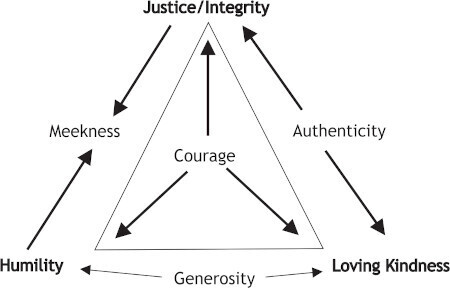Seek Love and Justice in 2020

Happy New Year! I trust you had a wonderful time with family and friends during the Christmas season.
Each year I pick a theme verse for our Fellowship family. For 2020, let us be mindful of Hosea 12:6: “But you must return to your God, maintain love and justice, and wait for your God always.” NIV
As human beings, we often revert to lists of values or virtues, when describing how to live the best life….the best Christian life. But no list is ever the same. Some lists become quite long because we do not want to miss anything.
You see these lists on posters, websites, screen savers, Instagram memes, and corporate mission statements. If they are not short, we forget them. Three or four words seem to be our limit, like the Fellowship’s three values: “Serve, Unite, Thrive.”
The Bible gives glimpses throughout its pages on those virtues that best embody “Kingdom values” that should guide and direct our daily lives:
God calls us to “justice, mercy and humility” in Micah 6:8 (NIV): “He has shown you, O mortal, what is good. And what does the LORD require of you? To act justly and to love mercy and to walk humbly with your God.” NIV
In Hosea 12:6 (NIV), God has called us again to “justice, mercy and waiting,” saying “But you must return to your God; maintain love and justice, and wait for your God always.”

In Matthew 23:23 (NIV) Jesus calls us to: “justice, mercy and faithfulness,” speaking of the hypocrisy of the religious establishment. Addressing the Pharisees, Jesus says, “….but you have neglected the more important matters of the law – justice, mercy and faithfulness…”
There appears to be three fundamental, or cardinal, virtues found in each of these three Bible verses. Apologist, Ravi Zacharias, pointed out that these three similar virtues seem to be God’s consolidation of all he taught Israel in terms of how they were to live their lives. They are three…a Trinity.
But what makes them special? Why might God reduce His “Kingdom values” to these three? They really are not a list, but a system by which we live our lives. What are the three?
- Justice (Hebrew=Mishpat). This is the idea of rectitude or virtue, someone’s moral virtue. Rectitude describes a person’s right living, correct judgement, and making fair choices. It describes a person who displays consistent integrity. Justice is the collective effect that naturally occurs when many people choose to live virtuous lives of integrity.
- Mercy (Hebrew=Chesed). This is a rich word packed with meaning, and most often translated in the Old Testament as “loving kindness” (newer Bible translations) or “grace” (older Bible translations). The word also alludes to a “steadfast devotion” or “loyalty” or a “covenantal love.” Chesed describes the spirit in which we are to administer justice.
- Humility. This third Kingdom value is stated in Micah 6:8. I Peter 5:5 tells us to “clothe ourselves with humility,” which is an act of our will! Hosea 12:6 mentions “waiting,” while Matthew 23:23 mentions “faithfulness.” Both “waiting” and “faithfulness” are virtues closely related to “humility,” in that both relate to our subservient view of ourselves under God. Humility is the prevailing virtue common to all three words.
You will note that in the centre of our Trinitarian triangle graphic is the word “courage.” All three core Kingdom values are linked together by courage: A “moral courage,” which comes from our faith in God, and a “moral courage” that drives us to live out these core values even when they are “counter-intuitive” to our fallen nature and “counter-cultural” in our broken, spiritually hostile society. Knowledge of these core values is not enough.
The courage to do them is what counts, whether that is: (a) doing what is right (integrity/justice); (b) admitting when I am wrong (humility); and (c) caring when ignoring is much easier (loving kindness). This all takes tremendous courage on a daily basis!
The beauty of these three core Kingdom values is that any combination of them provides a ‘system of virtues” that should guide a devoted follower of Christ.
For instance, combine both integrity/justice with loving kindness and the result is authenticity and trustworthiness, among other virtues. People like this are honest, loyal, and trusting, which is the glue for healthy relationships. The Beatitudes refer to this as being “pure in heart” (Matthew 5:8) or sincere, transparent, and authentic.
Combine loving kindness with humility and the result is generosity and respect, among other virtues. People like this are generous in spirit and attitude, and are caring, courteous, respectful, thoughtful, and understanding. When someone’s ego is not in the way, it makes for greater openness, receptivity, cooperation, transparency, and a desire to be a peacemaker. In the New Testament there is a koine Greek word, “macrothumia,” which embodies this idea of being “generous in your thinking.”
Stephen Covey, in his famous book, “The 7 Habits of Highly Effective People,” sought to capture this in the term, “abundant thinking.” This type of thinking is a mental attitude that sees the world in a way that is not restrictive, but cooperative. It does not fear loss. It sees life from a “win-win,” not “win-loss” vantage point. The Beatitudes refer to this as being “merciful” (Matthew 5:7) and being a “peacemaker” (Matthew 5:9).
Lastly, combining humility with integrity/justice results in meekness, among other virtues. People like this are teachable, assured, obedient, patient, and restrained. In the New Testament, the koine Greek word, “prautes” is a picture of a war horse in battle under restraint. All the wildness is still there, but it is under complete control. Some call this “true grit,” a person of stellar character, very competent, with much tenacity. The Beatitudes refer to this in Matthew 5:5 (NIV) as “Blessed are the meek, for they will inherit the earth.”
Justice, mercy, and humility are Kingdom values closely tied to Gospel penetration and advancement. They are core behaviours that direct the means by which we accomplish the end. Our ultimate end and purpose is to make disciples of Jesus Christ; to accomplish the Great Commission in the “spirit” of the Great Commandment.
